Report on Cheap Wines. By Dr. Druitt. (H. Renshaw.)—Dr. Druid
has reprinted from a medical journal a series of articles on the qualities, vinous strength, suitability to different constitutions and states of health, and prices of the natural wines of the Continent. He seems to be one of those who foresaw and encouraged from the first the reaction in favour of pure and =brandied wine, and dwells very earnestly on the advantages, both to health and rational enjoyment, to be' derived from the substitution of natural wine for the two or three more or less injurious compounds which for several generations have formed almost the only wines popular in the country. Not that he goes to the other extreme, or wishes to see "good old" port and sherry things of the past if people can afford to buy them good and to keep them the requisite ; length of time, and if they agree with them, well and good. But for people who cannot go to expense on what they drink, who want beverages stimulating, yet wholesome, and to be drunk freely, and who prefer to drink wine when they want it, and brandy and water when they want it to drinking wine and proof spirit mixed—i.e., port wine— "fortified " wines are out of the question. Dr. Druitt's work will be of great use in helping to disabuse the public mind of the lingering pre- judices that " light " wines are not "supporting," or that they are un- wholesome. He goes through the various wine-producing districts of Europe, giving the characteristics, strength, and varieties of flavour of the principal growths, including much useful information as to the numerous kinds of Hungarian wine now so freely imported, and the Greek wines introduced by Mr. Denman. The latter, it should be men- tioned, combine large variety of vinous flavour with strength greater lhan that of any other European natural wines, being thus especially
suitable for those who from constitution or habit incline to a fall and generous, though =fortified wine.






























 Previous page
Previous page